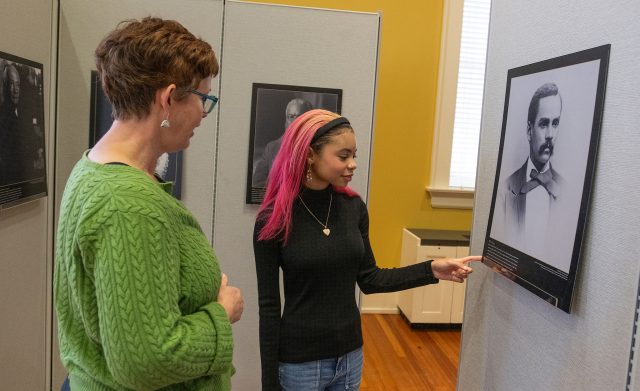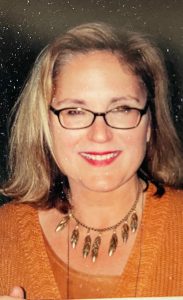
Molly Pasco-Pranger (left), chair and professor of classics, discusses the ’14 Black Classicists’ traveling exhibition on display at Bryant Hall’s Farrington Gallery with Kristen Randle, a sophomore classics major who helped install the exhibit. Photo by Thomas Graning/Ole Miss Digital Imaging Services
OXFORD, Miss. – The photographs and biographies of 14 prominent Black classicists are on display at the University of Mississippi and will be celebrated with a guest lecture on Nov. 3.
Michele Valerie Ronnick, distinguished professor of classics at Wayne State University, will discuss the history of Black classicism at 5:30 p.m. in Bryant Hall, Room 209. The lecture will be preceded by a reception at 4 p.m. in Bryant Hall’s Farrington Gallery, where the exhibit “14 Black Classicists” is on display until Nov. 28. The free event is hosted by the UM Department of Classics.
“The classics department particularly wanted to contribute to the events surrounding the 60th anniversary celebrations of Mr. Meredith’s enrollment,” said Molly Pasco-Pranger, chair and professor of classics. “We knew of Dr. Ronnick’s exhibit from installations elsewhere and thought that its focus on the role of education in advancing the liberation of the Black community was very much appropriate for this moment on our campus.”
Ronnick’s exhibition reflects on the role of advanced education – and the study of classics in particular – in establishing a free and prosperous Black community in the U.S. and in the building of the American civil rights movement during the 19th and 20th centuries.
“This exhibit illustrates beautifully some of the ways and reasons Black Americans have claimed space in the field of classics,” Pasco-Pranger said. “It’s true that the field has traditionally been very white, and sometimes also elitist, but that’s not the whole of its history, that’s not the whole of its present and that’s certainly not where we see its future.”
Ronnick will take attendees through the origins of Black classicism in the U.S. At the close of her lecture, she will refer to this dynamic in Mississippi, in particular.
The idea for Ronnick’s exhibition began in the early 1990s when she began to look for classicists of African descent, she explained.

Michele Valerie Ronnick, distinguished professor of classics at Wayne State University, is set to discuss her exhibition, ’14 Black Classicists,’ on Nov. 3 in Bryant Hall’s Farrington Gallery. Submitted photo
“Because classics had been the educational standard for many, many centuries in the West, and because people of African descent were part of the West and educated in the same traditions, there had to be Black classicists,” she said.
“Because these men and women were virtually unknown, I thought that the public needed to know about them as soon as possible, and I could not think of a better way to do this than to let people learn their names, see their faces and understand their accomplishments through an exhibit of their portraits.”
Expanded over time from “12 Black Classicists” to the current 14, the installation has been exhibited at more than 60 venues since its U.S. debut in 2003, as well as in the United Kingdom this spring.
“It focuses on the lives of men and women of African American origin who taught Greek and Latin at the college or university level and whose academic accomplishments helped pave the way for future generations of African Americans entering American universities,” Ronnick said.
“With them began the serious study and teaching of philology (the study of language) by people of African descent in this country. All who study language and literature in the U.S. today, be it Italian, Swahili, Sanskrit, English or Arabic, trace the origin of their disciplines to the men and women featured in my photo installation.”
The individuals profiled in the show include academicians, textbook authors, law school deans and university presidents. Figures include:
- William Sanders Scarborough, the first professional classicist of African American descent and the first Black member of the Modern Language Association who published a Greek textbook, in 1881
- Lewis Baxter Moore, who earned the first Ph.D. awarded by the University of Pennsylvania to an African American for his work on the Greek tragedian Sophocles
- John Wesley Gilbert, an archaeologist who was the first Black person to attend the American School of Classical Studies in Greece
- William Henry Crogman, co-founder of the American Negro Academy, who taught Greek at Clark University in Atlanta
- Edward Wilmot Blyden, who laid the foundation for West African nationalism and pan-Africanism
Kristen Randle, an Ole Miss sophomore majoring in museum studies, from Olive Branch, was invited by the classics department to assist in the installation of Ronnick’s exhibit.
“It’s very important to highlight classicists of color and show that there is a space for everyone in classics,” Randle said. “These men and women were trailblazers that found their liberation through classical education.
“I am so happy that Dr. Ronnick took the time to learn their stories and share their achievements with the public.”